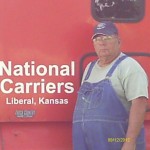Obstructive Sleep Apnea Affects National Carriers Drivers

“I hate having anything covering my face while I sleep,” team driver Lola Edwards said. “I went to have my DOT physical renewed and the doctor said my neck was too big and I needed a sleep test before he could sign off on my paperwork. I went to a sleep disorder company in Dallas where I paid $350 for the equipment to monitor myself while I slept that night. I hooked up the wires from the machine to myself and fell asleep. The next day I took the machine back and their people looked at the read out. It recorded my snoring was excessive and I had stopped breathing 165 times throughout the night.”
Lola had to purchase a CPAP machine for $1000. Sleeping in the bunk of a moving truck has proved challenging to keep the machine stabilized while keeping it attached to her face. The hose is attached to a small humidifier to help keep her nasal passages from drying out. To keep her face as unobstructed as possible while sleeping she choose a smaller nose mask verses a full face mask. After one week of using the device she is beginning to feel the positive effects.
According to the National Institute of Health, obstructive sleep apnea is a common disorder in which you have one or more pauses in breathing or shallow breaths while you sleep. Breathing pauses can last from a few seconds to minutes. They may occur 30 or more an hour. Typically, normal breathing then starts again, sometimes with a loud snort or choking sound. Sleep apnea usually is a chronic (ongoing) condition that disrupts your sleep. When breathing pauses or becomes shallow, you’ll move out of a deep sleep and into light sleep.
While BMI, neck size, and age are objective parameters for assessing the risk of OSA, there are many other risk factors, including upper airway and cranio-facial anatomy, excessive daytime sleepiness, loud snoring, observed apneas during sleep, high blood pressure, type 2 diabetes, morning headaches, age over 50, acid reflux or heartburn, bruxism, large tongue or crowded pharynx, cardiac conditions, recent traffic accident (including passenger vehicles), insomnia, restless legs, close relatives with OSA, mood disorders, erectile dysfunction, and others.
“Sleep apnea occurs in all age groups and both sexes, but there are certain factors that put you in at higher risk,” shares Jill Maschmeier, Director of Safety at National Carriers. “A family history of sleep apnea, being overweight, a large neck size (17 inches or greater for men, 16 inches or greater for women),being age 40 or older, having a small upper airway, having a recessed chin, small jaw or a large overbite, smoking and alcohol use, and ethnicity. My guestimate is nearly 50% of NCI drivers may fit into this category. If our doctor recommends a sleep test and that test finds that you have sleep apnea, you’re going to have to wear and use a CPAP (continuous positive airway pressure) machine while you sleep at night. There’s a little card that you’ll have to download information from so they can verify that you’re using it.”
 Owner operator Rich Enarson was the first driver in the state of Iowa to have a CPAP machine in his truck. After years of horrendous headaches, restless sleep, drowsiness while driving, deafening snoring and waking up more exhausted than when he went to bed, Rich sought medical help. He visited his doctor who made the proper diagnosis even though OSA was relatively unknown. The machines were only manufactured for electrical power in homes and would not work off an investor. Rich found an experimental machine and began using it until the technology caught up with the need. Recently, Medicare paid for him a second machine.
Owner operator Rich Enarson was the first driver in the state of Iowa to have a CPAP machine in his truck. After years of horrendous headaches, restless sleep, drowsiness while driving, deafening snoring and waking up more exhausted than when he went to bed, Rich sought medical help. He visited his doctor who made the proper diagnosis even though OSA was relatively unknown. The machines were only manufactured for electrical power in homes and would not work off an investor. Rich found an experimental machine and began using it until the technology caught up with the need. Recently, Medicare paid for him a second machine.
“The sleep test I participated in ten years ago was very primitive compared to what they do now. However, I knew immediately after the test this was what I needed. I felt like a new person. I now feel rejuvenated when I wake up compared to before. I use it even if I am taking a 15 minute nap. I use the full face mask and the benefits certainly outweigh any discomfort,” Rich stated.
Heather Wright, Compliance Manager for National Carriers cautions, “FMCSA warns that symptoms of sleep apnea are dangerous and potentially deadly for commercial truck drivers. These symptoms can include the following: daytime sleepiness, falling asleep at inappropriate times, loud snoring, depression, irritability, loss of sex drive, morning headaches, frequent nighttime urination, lack of concentration, and memory impairment.”
